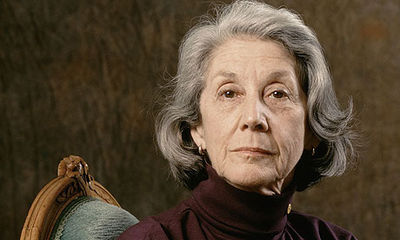South African Literature
The Subject Is: >> Soccer World Cup 2010 >> África beyond the World Cup >> South African Literature
 According to John Maxwell Coetze (in a 1987 interview), "South African literature is a literature in bondage. It is a less than fully human literature. It is exactly the kind of literature you would expect people to write from prison".
According to John Maxwell Coetze (in a 1987 interview), "South African literature is a literature in bondage. It is a less than fully human literature. It is exactly the kind of literature you would expect people to write from prison".It's almost impossible to talk about South African literature without any mention to the historical events of the last few decades. To understand opinions, information and the very perspective from which a poet or a writer speaks, one has to be ready to enter a world of deep contraditions both in society and values that compose what we call South Africa. To better understand those events, you can visit the sector Short Overview of the History of South Africa.
The most famous writers of South Africa are Nadine Gordimer (1923-), J.M.Coetzee (1940-) and the very Nelson Mandela (1918-). The two firts of them were awarded with the Nobel Prize in Literature in 1991 and 2003, while  former president Mandela was laureate with Nobel Peace Prize.
former president Mandela was laureate with Nobel Peace Prize.
 former president Mandela was laureate with Nobel Peace Prize.
former president Mandela was laureate with Nobel Peace Prize.Finally, besides those, we still must add the name of the Nigerian poet and novelist Ben Okri (1959-), 1991 Nobel Prize in Literature. He was awarded for "The Famished Road". T, novel that follows Azaro, an abiku or spirit child, living in an unnamed most likely Nigerian city. Okri is currently one the most famous African writers.
Narration in Gordimer's "The Ultimate Safari" (1989):
 Gordimer, a white South African writer well into her sixties when the story was published, takes on the voice of a young nameless black refugee girl from Mozambique. While Gordimer had written from a black perspective several times throughout her career, what sets this particular story apart is the fact that through most of its telling, the reader is not made fully aware of the narrator's race. While the few details of the story's setting and the narrator's circumstances that are offered from the outset hint strongly that she is black, it is not until the story's final scenes that the girl's nationality and race are confirmed. Gordimer's conscious manipulation of these facts is one of the techniques she uses that ultimately gives this story its poignancy. By keeping the reader uncertain about the girl's background, Gordimer effectively holds out the possibility in the reader's mind, on some level, that the narrator could be "the girl next door" and not simply another distant and nameless African refugee. While this may seem insignificant to the overall meaning of the story itself, in light of the fact that the vast majority of the story's readers at the time of its publication were not only white, but also non-South African, this technique effectively helped Gordimer to maximize the empathy the story's readers felt for the character and effectively contributed to her agenda of enlightening the world to the dehumanizing effects of her country's system of apartheid.
Gordimer, a white South African writer well into her sixties when the story was published, takes on the voice of a young nameless black refugee girl from Mozambique. While Gordimer had written from a black perspective several times throughout her career, what sets this particular story apart is the fact that through most of its telling, the reader is not made fully aware of the narrator's race. While the few details of the story's setting and the narrator's circumstances that are offered from the outset hint strongly that she is black, it is not until the story's final scenes that the girl's nationality and race are confirmed. Gordimer's conscious manipulation of these facts is one of the techniques she uses that ultimately gives this story its poignancy. By keeping the reader uncertain about the girl's background, Gordimer effectively holds out the possibility in the reader's mind, on some level, that the narrator could be "the girl next door" and not simply another distant and nameless African refugee. While this may seem insignificant to the overall meaning of the story itself, in light of the fact that the vast majority of the story's readers at the time of its publication were not only white, but also non-South African, this technique effectively helped Gordimer to maximize the empathy the story's readers felt for the character and effectively contributed to her agenda of enlightening the world to the dehumanizing effects of her country's system of apartheid.Plot summary of Coetzee's "Foe" (1986):
"Returning from Bahia, where she has been searching for a lost daughter, Susan Barton is put off the ship after a mutiny; she is accompanied only by the dead body of the captain, whose mistress she had been. She swims ashore and finds herself on the island with Cruso and Friday. Friday has been mutilated: he has no tongue. Who did this, where or how it happened, we are never told. After their rescue by a passing merchantman, Cruso dies aboard the ship and Susan and Friday are left to make their way in England. After she arrives in England, Susan drafts a memoir, "The Female Castaway," and seeks out the author Foe to have her story told. Coetzee's novel comprises four parts: beginning with Susan's memoir, it continues with a series of letters addressed to Foe, letters that do not reach him because he is hiding, trying to evade his creditors. The novel proceeds to an account of Susan's relationship with Foe and her struggle to retain control over the story and its meaning; it ends with a sequence spoken by an unnamed narrator (possibly standing for Coetzee himself) who revises the story as we know it and dissolves the narration in an act of authorial renunciation." (from D. Attwell, J.M.Coetzee: South Africa and the Politics of Writing, University of California Press)
Excerpt from Foe:
When I lay down to sleep that night I seemed to feel the earth sway beneath me. I told myself it was a memory of the rocking ship coming back unbidden. But it was not so : It was the rocking of the island itself as it floated on the sea...I
stretched out my arms and laid my palms on the earth, and, yes, the rocking persisted, the rocking of the island as it sailed through the sea...They say Britain is an island too, a great island. But that is a mere geographer’s notion. The earth under our feet is firm in Britain, as it never was on Cruso’s island.
Sources:
http://www.bookrags.com/wiki/Foe_%28novel%29
http://www.novelguide.com/a/discover/ssfs_19/ssfs_19_00023.html
http://en.wikipedia.org/wiki/Nadine_Gordimer
http://en.wikipedia.org/wiki/J._M._Coetzee
http://www.thenewblackmagazine.com/view.aspx?index=435
http://blackafricanliterature.blogspot.com/
http://www.southafrica.info/about/arts/drama.htm
http://en.wikipedia.org/wiki/List_of_South_African_writers

